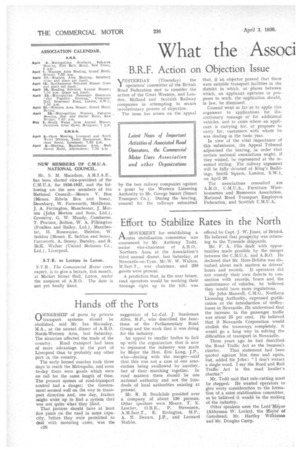.Hands off the Ports
Page 48

If you've noticed an error in this article please click here to report it so we can fix it.
OWNERSIIIP of ports by private transport systems should be abolished, said Mr. Ian Macaulay, M.A., at the annual dinner of A.R.O. North-Western Area, last Saturday. The situation affected the trade of the
country. Road transport had been of more advantage to the port of Liverpool than to probably any other port in the country.
The early horsed coaches took three days to reach the Metropolis, and even to-day there were goods which were on rail for the same length of time. The present system of road-transport control had a danger; the Government seemed well on the way to transport direction and, one day, traders might wake up to fuld a system that was not quite what they liked.
That justices should have at least five years on the road in some capacity, before they were permitted to deal with motoring cases, was the c26 suggestion of Lt.-Col. J. Sandeman Allen, M.P., who described the functions of the Parliamentary Road Group and the work that it was doing for the industry.
An appeal to smaller bodies to link up with the organization that is now to represent the industry was made by Major the Hon. Eric Long, J.P., who—dealing with the merger—said that this was not a case of one association being swallowed by another, but of their marching together. In road matters there should be one national authority and not the hundreds of local authorities existing at present.
Mr. R. B. Stockclale presided over a company of about 130 persons. Other speakers were Messrs. T. E. Lescher, 0.B.E., P. Stevenson, A.M.Inst.T., E. Errington, M.P., A. N. Deuars, J.P., and Leonard Stubbs.












































































































